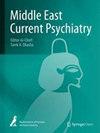阿拉伯语畸形关注问卷(DCQ)的心理计量验证
IF 1.6
Q3 PSYCHIATRY
引用次数: 0
摘要
由于缺乏有效的工具,在阿拉伯语环境中对畸形关注(DC)的研究受到了阻碍。由于 "畸形关注 "具有文化依赖性,因此需要在全国范围内使用心理计量学上可靠的测量方法,以便在特定的社会和人群中密切而准确地研究这一问题。本研究旨在调查 "畸形关注问卷"(Dysmorphic Concern Questionnaire,DCQ)阿拉伯语译本在黎巴嫩成年人中的心理测量特性。研究涉及 515 名参与者(69.9% 为女性,平均年龄为 27.55 ± 10.92 岁),他们填写了一份自我报告的网络问卷。确认性因素分析表明,阿拉伯语 DCQ 的单因素结构与数据非常吻合,因此具有很好的建构效度。在我们的样本中,麦当劳欧米茄系数为 0.89,证明了极好的内部一致性。此外,多组分析的结果表明,DCQ 在度量、构型和标度层面上与性别间的结构模型相似。最后,DC水平与身体欣赏和自尊成反比,与饮食失调症状成正比,从而支持了阿拉伯语DCQ的并发和收敛效度。翻译成阿拉伯语的 DCQ 似乎是一种有效的自我评估测量方法,可以捕捉到存在的 DC 表现。预计阿拉伯语 DCQ 将为世界各地从事阿拉伯语工作的医护人员和研究人员提供便利。本文章由计算机程序翻译,如有差异,请以英文原文为准。
Psychometric validation of the Dysmorphic Concern Questionnaire (DCQ) into Arabic
Research on dysmorphic concerns (DC) in Arabic-speaking contexts is hampered by the lack of validated tools. Because DC are culturally dependent, psychometrically sound measures are needed at the national level to closely and accurately investigate the construct in specific societies and populations. The purpose of the current research was to investigate the psychometric properties of Dysmorphic Concern Questionnaire (DCQ) in its Arabic translation in Lebanese adults. The study involved 515 participants (69.9% females, mean age of 27.55 ± 10.92 years) who completed a self-report, web-based questionnaire. Confirmatory factor analysis indicated excellent construct validity, as the one-factor structure of the Arabic DCQ fits well with the data. McDonald’s omega was 0.89 in our sample, evidencing an excellent level of internal consistency. Furthermore, the results from the multigroup analysis showed that the DCQ holds similar structural model between genders at the metric, configural, and scalar levels. Finally, DC levels correlated inversely with body appreciation and self-esteem and positively with disordered eating symptoms, thus supporting the concurrent and convergent validity of the Arabic DCQ. The DCQ translated into Arabic appears to have a valid self-assessment measure to capture the presence of DC manifestations. It is anticipated that the Arabic DCQ will be advantageous for healthcare professionals and researchers working with Arabic-speaking people around the world.
求助全文
通过发布文献求助,成功后即可免费获取论文全文。
去求助
来源期刊

Middle East Current Psychiatry
Medicine-Psychiatry and Mental Health
CiteScore
3.00
自引率
0.00%
发文量
89
审稿时长
9 weeks
 求助内容:
求助内容: 应助结果提醒方式:
应助结果提醒方式:


